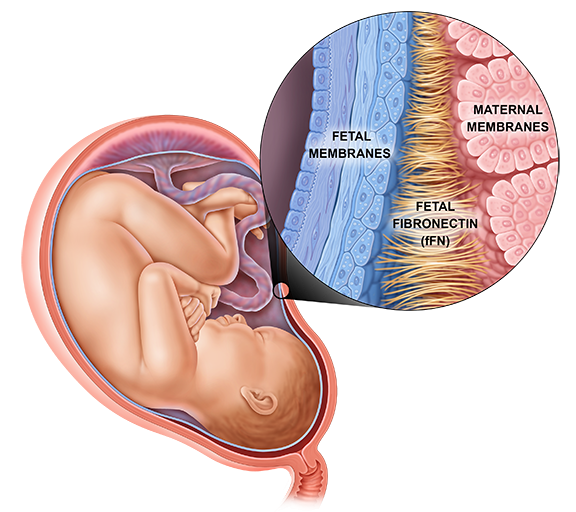Perinatal
Improving women’s health is at the core of Hologic’s technology and products. One essential pillar in the Hologic Diagnostic Solutions portfolio is perinatal testing. The Rapid fFN® test is a safe, reliable, and non-invasive test that can help providers determine a pregnant woman’s risk of delivering preterm.
Don’t wonder
if sending her home is the right decision…
Be confident
that it is.
The use of fetal fibronectin (fFN) testing can help reduce unnecessary admissions and hospitalizations and help direct care and resources to patients who need it most.
 |
Fetal Fibronectin: A powerful predictor of preterm birthfFN is an adhesive glycoprotein found at the maternal-fetal interface which functions like a glue to bind the baby to the uterus during fetal development.1 fFN is generally absent in vaginal secretions during weeks 16 to 35 of gestation, so if fetal fibronectin is detectable in vaginal discharge during pregnancy weeks 22-35, it means that the protein is “leaking.” This can alert healthcare providers that the patient is at risk of preterm birth. |
The Healthcare Benefits of fFN Testing

- Timely and appropriate interventions, such as antenatal steroids and magnesium sulfate.
- Avoidance of unnecessary hospitalizations. One study showed that the average length of stay for patients with symptoms of preterm labor was reduced from 5.2 days to just 0.6 days after fFN testing was adopted.
- Effective transfer of patients at high risk of imminent preterm birth to a hospital with an appropriate NICU.
Interpreting Results
Negative Result
- Approximately 80% of patients will get a negative result.
- A negative result means that patients have a less than 1% chance of giving birth in the next two weeks.
- A negative result can help avoid unnecessary drug treatments, bed rest and hospitalizations. This knowledge can also provide peace of mind, freeing patients to continue with current activities without unnecessarily cancelling or rescheduling plans.
- The Rapid fFN test can be repeated as often as every 2 weeks to monitor ongoing risk.
Positive Result
- Approximately 20% of patients will get a positive result
- A positive result means the body is “leaking” fetal fibronectin, a sign that the patient may be preparing to give birth.
- A positive result does not necessarily mean the patient will deliver soon, but it will alert the doctor to the fact that they are at higher risk for preterm labor.
- The Rapid fFN test can be repeated as often as every 2 weeks to monitor ongoing risk.

